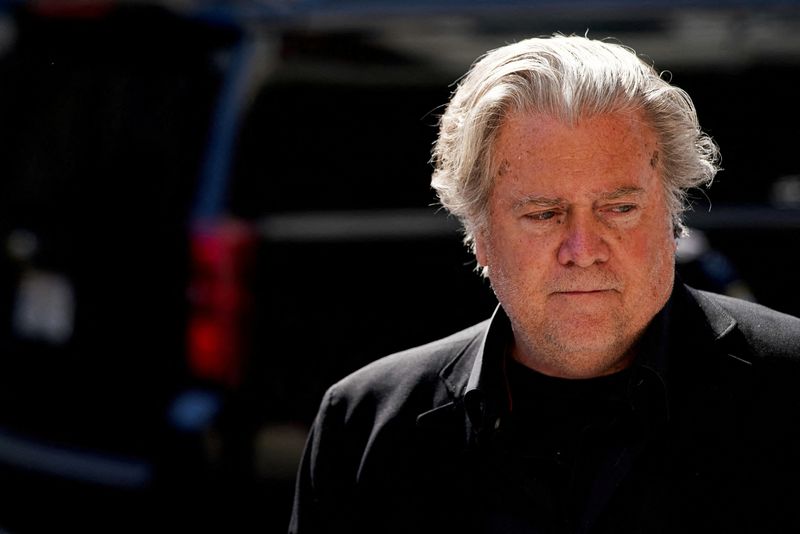Prosecutors set to urge conviction of Trump ex-adviser Bannon
2022.07.22 13:22

FILE PHOTO: Steve Bannon, talk show host and former White House adviser to former President Donald Trump, arrives to U.S. District Court in Washington, U.S., June 15, 2022. REUTERS/Elizabeth Frantz/File Photo
By Sarah N. Lynch
WASHINGTON (Reuters) – Federal prosecutors are due to make their final pitch to jurors on Friday to convict Steve Bannon, Donald Trump’s former presidential adviser, on charges of contempt of Congress for defying a subpoena by the committee investigating last year’s attack on the U.S. Capitol.
The prosecution and defense are expected to deliver closing arguments to the 12-member jury in federal court, with deliberations expected to begin afterward. The defense rested its case on Thursday without calling any witnesses after the prosecution rested on Wednesday, having called two witnesses over two days.
Bannon, 68, has pleaded not guilty to two misdemeanor counts after rebuffing the House of Representative select committee’s subpoena requesting testimony and documents as part of its inquiry into the Jan. 6, 2021, rampage by Trump supporters trying to overturn his 2020 election defeat.
Prosecutors said they expect their arguments to last about 30 minutes, plus 15 for rebuttal. The defense said it plans to take roughly the same amount of time to make its arguments.
The defense made motions to U.S. District Judge Carl Nichols asking him to acquit Bannon, arguing the prosecution failed to prove its case, or dismiss the charges because his lawyers were blocked from calling as witnesses lawmakers who are members of the committee. Such motions seeking acquittals and dismissals at the end of a trial are common and rarely granted.
David Schoen, one of Bannon’s attorneys, told Nichols that Bannon had wanted to testify at the trial, but opted not to do so due to the limits the judge placed on the kinds of arguments the defendant could make.
Bannon was barred from arguing that he believed his communications with Trump were subject to a legal doctrine called executive privilege that can keep certain presidential communications confidential. The judge also prohibited Bannon from arguing that he relied on legal advice from an attorney in refusing to comply.
Bannon’s primary defense in the trial was that he believed the subpoena’s deadline dates were flexible and subject to negotiation between his attorney and the committee.
Schoen told Nichols on Thursday he felt Bannon’s lawyers had been “badly stymied in being able to present a defense” due to some of the judge’s pretrial rulings limiting the scope of their arguments. Nichols replied that some of his rulings were bound by legal precedent “that I don’t even think is right.”
The main prosecution witness was Kristin Amerling, a senior committee staff member. She testified on Wednesday that Bannon disregarded the subpoena’s two deadlines, sought no extensions and offered an invalid rationale for his defiance – a claim by Trump involving a legal doctrine called executive privilege that can keep certain presidential communications confidential.
Trump’s supporters stormed the Capitol and attacked police in a failed effort to block formal congressional certification of his 2020 election loss to Democrat Joe Biden, which Trump falsely claims was the result of widespread voting fraud. Bannon was a key adviser to Trump’s 2016 presidential campaign, then served in 2017 as his chief White House strategist.
Bannon has spoken only once in court throughout the trial. He said, “Yes, your honor,” when Nichols asked if he agreed not to testify.
Outside the courthouse, Bannon has let loose in front of the TV cameras. On Thursday, Bannon told reporters he probably has testified in various cases “more than anybody else in the Trump administration” and that in those instances lawyers negotiated and they worked it out “every time.”
“One last thing. I stand with Trump and the Constitution,” Bannon added.








